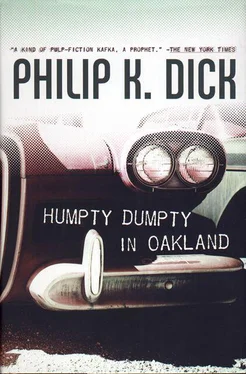Al nodded. The woman’s mellow tone had altered; a flatness, a surprising harshness had come into it. She really did not like Harman, he realized. Her feelings had come out because she was not a hypocrite. It was not possible for her to pretend to like someone she did not like.
“You think,” he said, “I ought to steer clear of Harman.”
Her smile had become softer, now. More pensive. “Well,” she said slowly, “that your business, of course. Maybe you know him better than I do.”
“No,” he said.
“I think you a honest man and he not.” She regarded him with calmness. And yet, behind the calmness, was agitation. So difficult, he thought, for a Negro. To sit here with a white man and discuss in unflattering terms another white man; at any moment the boom can fall on her. I can cut her off, dismiss her. But it was not precisely that that she feared; it was more that she feared he would cease to pay attention to her. That he would freeze up inside his white-man’s prejudice and ignore what she said.
“I know you have my interest at heart,” he said, but although it was deeply meant it had a phony ring. A phrase, merely.
She nodded her head up and down.
“I’ll watch my step,” he said.
Not long thereafter, as Jim Fergesson lay on the floor of his garage, beneath a Buick, he heard a car pull up not far from him and stop. By the sound of it he guessed it to be a new car. He wheeled himself out, and found himself facing the fender of a nearly-new Cadillac. The door had already opened and a man in a business suit and black shiny shoes was stepping forth.
“Hi there, Mr. Harman,” the old man said, sitting up. “I see you got back. I was out when you were by before. Not too much wrong with your car, is there? A nearly-new Cadillac like that.” He laughed nervously, because he did not want to get involved with Harman’s car to any extent; he had neither the tools nor the experience for this kind of car, this new expensive car with its interminable power assists and accessories.
Harman, smiling, said, “Every machine has bugs, Jim. As you’re always telling me.”
“That’s sure true,” Fergesson said.
“Nothing serious,” Harman said. “Just the greasing.”
“Okay,” Fergesson said, with relief.
Harman said, “Jim, they tell me you’re quitting business.”
“I’m taking a rest,” the old man said.
“For good?”
“It’s sold,” he said.
“I see,” Harman said.
“Listen,” the old man said, starting to put his hand on Harman’s shoulder and then quickly changing his mind; he stood wiping his greasy hands with a rag. “There’s a couple of good garages in town; you don’t have to worry. I know a couple of mechanics you can trust. These days, with these God damn labor unions—”
“Yes,” Harman interrupted. “The employers have to hire the men the unions send over. Whether they’re competent or not.”
“We’re both in business,” Fergesson said. “We know how it is.”
“You’ll get men,” Harman said, “who stand around and do no work at all. And when you go to fire them—” He gestured.
“It’s impossible,” Fergesson said.
“Illegal.”
“And that’s why you got nothing but leaf-rakers, like in the W.P.A. days. It’s socialism.” The old man felt excitement in him, a kind of frenzy. How pleasant it was to stand here like this with this man, his well-dressed customer Mr. Harman who drove a 1958 Cadillac, talking to him on an equal basis, one businessman to another. That was what it was; they were equals. His hands jumped about madly; the rag slipped away and he gave it a kick to free it from his trouser cuff. “I been in business a long time. And look what taxes have done to me. It’s part of their system to make it ridiculous for a man to devote his life to work because when he’s all done, what does he have? Income tax.” He spat on the floor.
“Yes,” Harman said in his cultured calm voice. “The income tax definitely is part of the share-the-wealth scheme.”
“They put it over on America,” the old man said. “During Franklin Roosevelt’s administration. Every time I think of that Roosevelt—and that son of his, that colonel.”
With a mild, good-humored smile, Harman said, “That takes me back. Thinking about Eliot as a colonel.”
“I’m keeping you,” the old man said.
“No,” Harman said.
“You got lots to do and so do I. I tell you, Harman, we both got too much to do. Only the difference between you and me is that you got the vitality and youth to do it, and I don’t. I’m worn out. I tell you the truth; I’m finished.”
“Hell no,” Harman said.
“It’s a fact.”
“Why? My God, when I came in—”
“Sure, I was down under that Buick. But listen.” The old man moved as close as possible to Harman—as close as he could without getting grease on him—and said in a low voice, “One day when I’m down under that; you know what? I’m going to have a heart attack and die.” He stepped back. “So that’s why I have to get out of here.”
“And with all your skill,” Harman said.
“It’s a shame,” the old man said. “But I have to listen to Fratt; that’s his business. I go to experts. I’m not a doctor. All I know is that for years now I had indigestion and I went to Fratt and at first he didn’t find anything, but then he took my blood pressure.” He told Harman what his blood pressure was. It was terrible, and he saw Harman’s face show the response.
“That’s a shame, Jim,” Harman said.
“But if I take it easy—I don’t mean loaf around the house— but find something less strenuous. It’s the lifting.” He paused.
Harman said, “Had you ever thought of hiring someone? To do the heavy work?”
“Could never find anyone to rely on.”
“Did you discuss it with your broker?”
“You mean Matt Pestevrides?”
“Your attorney,” Harman said. “Or your realtor. Who do you talk over your business matters with? Who did you consult before you sold your place?”
The old man was silent.
“Didn’t you discuss it with someone experienced in business matters? You could have gotten someone in to manage your shop for you, a foreman. It’s done all the time. Any good business consultant could have researched it for you and come up with someone reliable; that’s a matter of care and study, a matter of procedure.”
The old man could think of nothing to say.
“I’m surprised at your broker,” Harman said.
The old man said, “I just called him up and said I wanted to sell my garage, for health reasons.”
“A distress sale. Didn’t you take a loss?”
“Yes,” he said.
“If you don’t mind my asking, how much did you get for it?”
“Thirty-five thousand.”
Harman glanced about him at the building. “That seems a fair price.” He pondered, rubbing his lower lip with his knuckle. “Listen, Jim,” he said. “Obviously it’s crying over spilt milk to discuss any use you might have put your garage to. But you did get your price. You did cash yourself out.”
“Yes,” the old man said, feeling pride.
Glancing up acutely, Harman said, “I hope you didn’t take paper.”
“Paper?”
“Seconds. Second deeds of trust.”
“Oh no,” he said at once. “No paper. Ten thousand cash and the rest at two hundred a month.”
“At what interest?”
The old man could not remember. “I’ll show you.” He led the way to his cluttered office; Harman followed with long strides. “Here.” From the desk drawer he got the papers; laying them out he stepped back to permit Harman to see.
For a time Harman examined the papers. “I think you did very well,” he said at last.
Читать дальше










